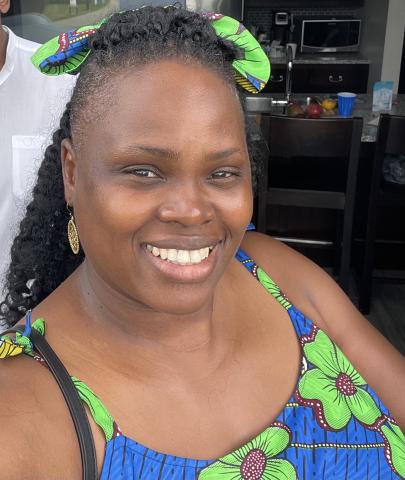Carol White was a young teen when her mother, who was in the military, relocated the family to Israel from their home in Maple Heights. Initially, the move was a bit of a culture shock, but the 18 years White spent in Israel shaped her views on eating healthy, minimally processed food and, importantly, access to it. Today, White is a chef who co-owns the restaurant Convenient Vegan on Larchmere. She also founded Shyne Bright LLC, a food justice initiative to bring fresh, nutrient-dense, ready-to-eat meals to daycare centers, schools and other federally funded food programs. Shyne Bright is supported by a fellowship from the Nourishing Power Network. Read more about Carol White.
Tell us about your experience in Israel and how it shaped your perspective on food.
It definitely shaped who I am now. When I left Cleveland, I was not the same vegan that I am now. I was eating wheat bread, tofu slices, vegan ice creams, those kinds of things. Then I moved to Israel and I realized that eating vegan there was so easy. There are Parve regulations in Israel, so you can just look at labels and menus and just know that if something is Parve, then there’s no meat or dairy. Even when you go to a falafel stand and you’re building a falafel, you have these wonderful condiments—cucumbers, cilantro, pickled onions and pickled beets. So that’s where I really learned how to eat vegan. I also worked in Israel’s largest tofu manufacturing factory—they also produce salads and other foods, and that’s where I learned how to prepare really delicious foods.
What was the genesis of the Shyne Bright initiative?
When my husband and I came back to Cleveland in 2010, we had a bit of a culture shock. Our whole family is vegan and while it was easy to eat that way in Israel, we kept running into day care facilities and schools here where it was not easy, so we ended up having to pack all of their food. I kept asking “why”—it didn’t seem like it should be that hard.
Then, I also became involved in our children’s school and I started learning more about food insecurity and accessibility to good quality food. I wanted to be able to make a change in the community so that people have access to quality food without it being a financial hardship. Quality food shouldn’t be something just for the wealthy.
So my idea with Shyne Bright is to make improvements in places that serve food which is supported by federal dollars—so that’s daycares, schools and senior living facilities. I’ve been collecting data and interviewing people involved with food systems organizations, health departments and school food service directors. I’m finding out what challenges they have and trying to better understand what they truly need to make a change.
In your ideal world, what does the food system in a school look like?
In schools, it’s when children are served fruit that’s first choice. So for example, apples that are whole or freshly sliced, not apples that come in bags. Or food that’s prepared on site, fresh, not packaged elsewhere and delivered. Originally, that was taken out of schools because the thinking was that we were saving time and money. But it compromised quality. So for me, it looks like serving food to children that’s fresh and minimally processed.
What do you want people to better understand about food?
Overall, I want to build awareness that we all can eat better. We don’t have to have as many processed foods. We can eat fresher. We can have more colorful plates. If you choose to eat meat, ask where it came from. It’s just about being more intentional about what we consume because it has an impact on our quality of life and our mental health. There’s often a disconnect that food isn’t a factor in our quality of life, but it is.


